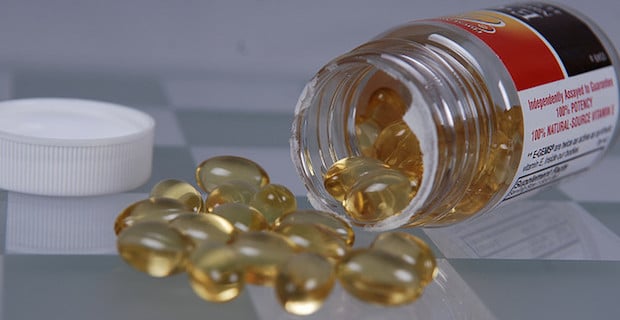
With what can seem like an endless selection of products and brands, choosing a dietary supplement that fits your lifestyle may seem like a confusing task. However, knowing what to look for on the supplement label can help you understand what product might best help you reach your personal wellness goals. Remember these eight helpful tips next time you’re considering which dietary supplement to take and the choice may not seem so confusing after all.
Read the Entire Label & Take as Directed
The label and directions are there for a reason. Just like you wouldn’t buy a new article of clothing without looking at its size, you shouldn’t purchase or take supplements without reading the label. It includes details that instruct you how to properly take the supplements to receive their maximum health benefits.
Read more about vitamin supplements that are more harmful than healthful
Take the Suggested Serving Size
The serving size is generally listed at the top of the label and gives you the manufacturer’s suggested serving expressed in a unit such as tablet, capsule, softgel, packet, teaspoon, etc. Serving sizes vary from supplement to supplement which is why it’s important to make sure you’re taking the correct dosage and not falling short or taking more than you need.
Pay Attention to the Percent Daily Value
The U.S Food and Drug Administration recommends a daily intake for certain nutrients, and the Percent Daily Value (PDV) will tell you what percentage of the recommended daily intake for adults is provided by the supplement. For example, if the supplement label lists 75% as its PDV, it means that one serving provides three quarters of FDA’s recommended daily intake. An asterisk under the “Percent Daily Value” heading is an indicator that the FDA has not established one for that particular nutrient.
Understand Measurement Abbreviations
Each nutrient contained in the supplement will be listed on the bottle followed by a scientific unit of measurement. I.U. stands for International Unit, and is a standard global unit of measure for fat soluble vitamins (A, D and E). Mg and mcg stand for milligram and microgram, respectively, both of which are standard units of measure for water soluble vitamins (C and B complex) and minerals. One milligram equals 1000 micrograms.
Ensure You Can Contact the Manufacturer
The manufacturer or distributor is required by law to list its name and location of business or phone number on the label. Many companies also list a website address or toll-free number. This is a sign that the manufacturer is open and willing to answer your questions or hear your concerns. Don’t buy any supplements if you can’t clearly tell who is responsible for producing the product. Responsible companies know this and clearly state how consumers can reach them.
Store Supplements in a Cool, Dry Place
Moisture, humidity, light, or heat can accelerate degradation and eventually will render the supplements ineffective. A steamy and moist bathroom is not the best place to store supplements. In addition, avoid places that are easily reached by children, like a low cabinet or the refrigerator. To ensure full potency, it is also important to use the supplements by the expiration date. If the date has passed, throw out the bottle and buy a new one.
If it Sounds Too Good To Be True, it Probably is
As with anything, when it comes to dietary supplements it is best to stick with this mantra. Dietary supplements are meant to do just that-supplement what may be lacking in our diet. They are not magic bullets that cure all of our health concerns, but are part of an overall healthy lifestyle that includes other important practices such as a balanced diet, regular exercise, adequate sleep, etc. Dietary supplements provide many important health benefits, however if a product claims to do over-the-top miraculous things for your health, it is important to take a step back and evaluate the scientific evidence supporting those claims.
Read more about herbal supplement contamination
Talk to your Healthcare Professional
These tips are helpful and provide a good starting point, but they are no replacement for conversations with your healthcare professional. Make sure to talk to your doctor, nurse practitioner, pharmacist, or other healthcare professional about any modifications made to your healthcare routine. Whether you’re already taking a supplement, or are considering adding one to your wellness regimen, healthcare professionals are there to help you make healthy choices that best benefit your lifestyle.
Image: Dan Tentler




